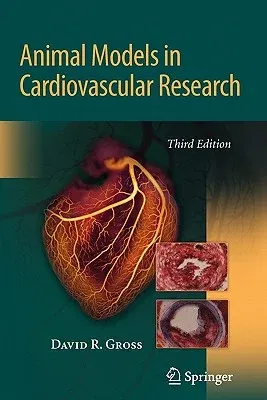David Gross
(Author)Animal Models in Cardiovascular ResearchPaperback, 29 October 2010

Description
This new edition of Animal Models in Cardiovascular Research describes historical and recent advances in our understanding of the cardiovascular system from studies conducted in a variety of animal models. Since the last edition we have witnessed an explosion in the use of both congenic and transgenic animals. The use of specific knock-in and knock-out transgenic models has resulted in an avalanche of genetic, molecular and protein-based information that, potentially, could result in an amazing new array of treatment and management options. However, the results of these studies also introduce a sometime bewildering array of redundant, overlapping and competing molecular pathways involved in both physiological and pathological responses.
This third edition is designed to provide a better basis for understanding and using animal models in the current climate of background knowledge and information. It is significantly different than the previous two editions. Chapter 1 is updated from the previous editions addressing general principles of animal selection. It also provides expanded tables of normal physiological values for easy reference. Chapter 2 covers preoperative care, pre-anesthesia, chemical restraint, and includes a significantly expanded section on pain recognition and analgesia particularly in rodents. Chapter 3 provides a summary of normal cardiovascular parameters obtained from intact, awake animals. The data have been rearranged in outline rather than the previous tabular form hopefully resulting in easier reference.
Chapter 4 addresses the techniques, problems and pitfalls of measuring cardiac function in animals. There is an emphasis on the proper use of these measurements to develop new treatment and management strategies as well as using them to study mechanisms of disease. Chapter 5 emphasizes the techniques, problems and pitfalls involved in the measurement of arterial function and ventricular/arterial coupling dynamics. Again the emphasis is on the use of these parameters to develop new treatment and management strategies and for studying the mechanisms of disease. Chapter 6 is a all new chapter dealing specifically with the problems and pitfalls inherent in using isolated heart preparations. The need for this chapter became apparent because so much information was published using obviously non-physiologic preparations. The use of both pumping and non-pumping preparations are described along with techniques necessary for using hearts from larger species where oxygen carrying capacity of the perfusate is critical. The importance of hypoxia and anoxia in the interpretation of results is discussed.
Chapter 7 focuses on the cardiovascular effects of the post-operative analgesic drugs commonly used today and how to avoid potential problems resulting from these effects when reporting experimental data. These data are also presented in outline form rather than the tabular format used in the two previous editions. Chapter 8 addresses the use of naturally occurring animal models of valvular and infectious cardiovascular disease. The information presented has been updated and expanded from the second edition. Chapter 9 examines iatrogenic models of ischemic heart disease.
Chapter 10 is new. It provides a review of iatrogenic, transgenic and naturally occurring animal models of cardiomyopathy and heart failure. Chapter 11 includes new, updated and revised information reviewing iatrogenic and transgenic models of hypertension. Chapter 12 contains new, and updated information on iatrogenic and transgenic models of atherosclerotic disease.
Chapter 13 is completely new material dealing with animal models for the study of neurohumeral and central nervous system control of the cardiovascular system. Chapter 14 is also new. It provides examples of cardiovascular studies involving the use of specific transgenic models not normally associated with the cardiovascular system, such as estrogen receptor knockouts, to study cardiovascular function.

